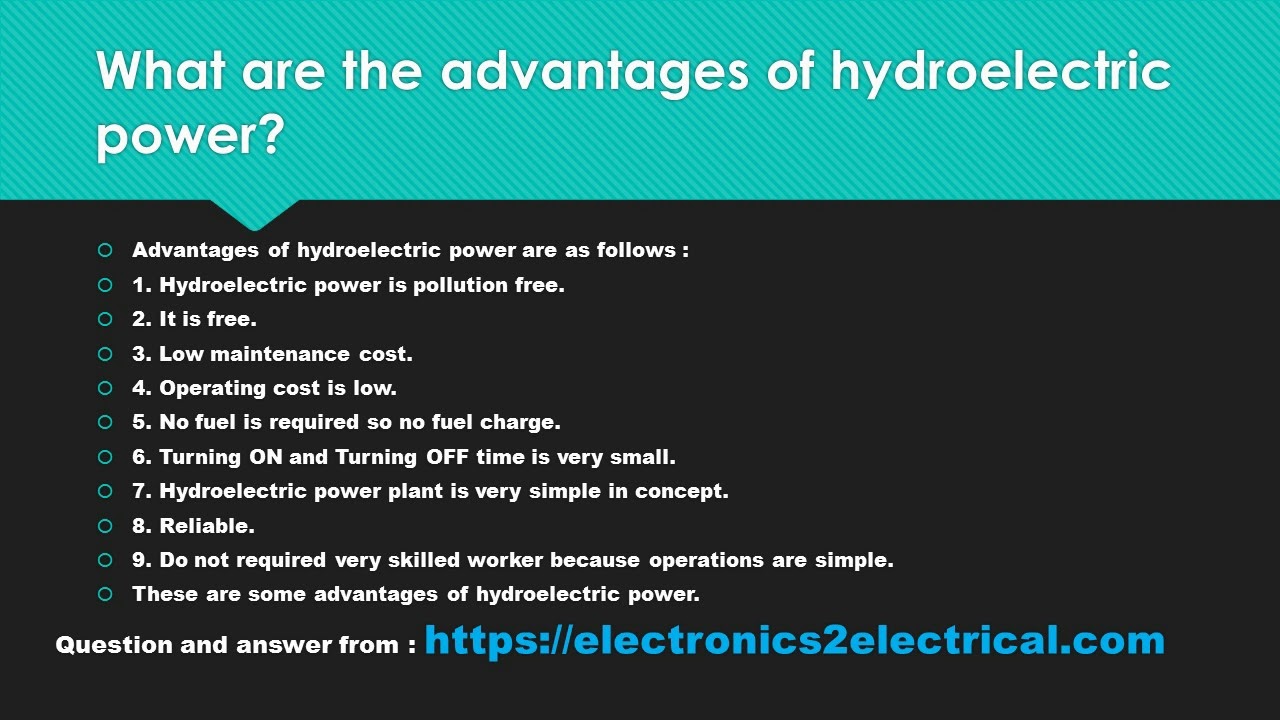Advantages of Hydropower
Hydropower is a renewable energy source that utilizes the force of flowing or falling water to generate electricity. It has been harnessed for centuries and continues to be a reliable and sustainable solution to meet our energy needs. In this article, we will explore the numerous advantages of hydropower and how it contributes to a greener future.
Clean and Renewable Energy
One of the greatest advantages of hydropower is its cleanliness and renewability. Unlike fossil fuels, which release harmful greenhouse gases into the atmosphere, hydropower generates electricity without any direct emissions. It is a sustainable energy source that relies on the water cycle, making it an excellent alternative to non-renewable energy sources.
Abundant and Reliable
Water is an abundant resource on our planet, and hydropower takes advantage of this availability. Rivers, streams, and even ocean tides can be harnessed to generate electricity. This abundance ensures a continuous supply of power, making hydropower a reliable source of energy. It is not dependent on external factors like sunlight or wind, ensuring stable and consistent power generation.
Cost-Effective
Hydropower is a cost-effective energy solution in the long run. While the initial investment for building a hydropower plant can be significant, the operational and maintenance costs are relatively low. Once the infrastructure is in place, the energy generation is essentially free, as the water source is naturally replenished. This makes hydropower economically viable and an attractive option for long-term energy planning.
Flexibility in Power Generation
Hydropower plants can quickly adapt to changing energy demands. By adjusting the flow of water or controlling the number of turbines in operation, the power output can be easily regulated. This flexibility allows hydropower to complement other renewable energy sources, such as solar and wind, which may be intermittent. It provides stability and grid reliability by compensating for fluctuations in electricity supply.
Water Management and Flood Control
Hydropower systems often involve the construction of dams, which not only generate electricity but also offer water management benefits. These dams can regulate water flow, store excess water during periods of heavy rainfall, and release it during dry seasons to ensure a steady water supply for irrigation, drinking water, and industrial use. Additionally, dams can help control flooding by storing excess water and releasing it gradually.
Ecosystem Support
Well-designed hydropower projects can have positive impacts on local ecosystems. By creating reservoirs, they provide new habitats for aquatic species, supporting biodiversity. Furthermore, fish ladders and other measures can be implemented to facilitate fish migration and minimize disruptions to natural river ecosystems. Careful environmental planning and management are essential to ensure the coexistence of hydropower generation and the preservation of aquatic life.

Hydropower offers numerous advantages as a clean, renewable, and reliable source of energy. Its cost-effectiveness, flexibility, and positive environmental impacts make it an attractive option for sustainable power generation. As we strive for a greener future, harnessing the power of water can play a significant role in reducing our dependence on fossil fuels and mitigating climate change.
Frequently Asked Questions about the Advantages of Hydropower
1. What are the main advantages of hydropower?
Hydropower offers renewable and clean energy, reduces greenhouse gas emissions, provides reliable power, and helps with water management.
2. How does hydropower contribute to renewable energy?
Hydropower relies on the natural water cycle and gravity, making it a renewable energy source that doesn’t deplete natural resources.
3. What environmental benefits does hydropower provide?
Hydropower plants have minimal air pollution, no greenhouse gas emissions during operation, and help to mitigate climate change.
4. How does hydropower help with water management?
Hydropower plants can regulate water flow, prevent floods, and provide irrigation for agricultural purposes.
5. Does hydropower offer a reliable source of energy?
Yes, hydropower is reliable as water flow can be controlled, making it a stable and consistent source of electricity.
6. Can hydropower be used for both large-scale and small-scale energy production?
Yes, hydropower can be harnessed for both large-scale projects like dams and small-scale installations like micro-hydro systems.
7. Are there economic advantages to hydropower?
Hydropower projects create jobs, stimulate local economies, and provide long-term cost stability compared to fossil fuel-based energy sources.
8. Does hydropower help in reducing dependence on fossil fuels?
Yes, hydropower reduces the need for fossil fuel-based power plants, decreasing reliance on non-renewable energy sources.
9. Can hydropower contribute to rural electrification?
Hydropower can bring electricity to remote areas that are not connected to the main power grid, improving the quality of life for rural communities.
10. Are there any benefits of hydropower in terms of flood control?
Hydropower plants can regulate water flow, preventing downstream flooding by storing excess water during heavy rainfall and releasing it gradually.
11. How does hydropower compare to other renewable energy sources?
Hydropower has a higher energy y production capacity and can provide a more consistent power supply compared to wind or solar energy.
12. Does hydropower have a low carbon footprint?
Yes, hydropower has a minimal carbon footprint as it does not produce greenhouse gas emissions during operation.
13. Can hydropower be used in combination with other renewable energy sources?
Hydropower can be integrated with wind and solar energy to create a more balanced and reliable renewable energy system.
14. Are there any disadvantages or challenges associated with hydropower?
Hydropower can have environmental impacts such as habitat disruption and fish migration issues. Large-scale projects may also require significant upfront investments.
15. Is hydropower a widely used energy source globally?
Yes, hydropower is one of the most widely used renewable energy sources worldwide, with many countries relying on it for a significant portion of their electricity generation.




